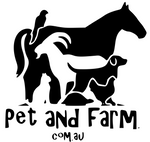Description
Balanced diet for all parrots including ringnecks, conures, amazons, eclectus, cockatoos & macaws. Use as a healthy replacement to seed mixes.
Key Features
- Totally edible – Reduces waste and mess.
- Better Nutrition – Enriched with essential amino acids (lysine, methionine), omega-3 & 6, vitamins & minerals.
- Improved Health – Low fat for weight control, with quality protein for good feather condition.
Ingredients
Processed cereals & legumes (wheat, barley, oats, peas, lupins), soy & whey protein isolates, lysine, methionine, vegetable oils, omega-3 & omega-6 fatty acids, carotenoids, vitamins A, B1, B2, B3, B5, B6, B9, B12, C, D3, K, biotin, choline, calcium, phosphorus, potassium, sodium, magnesium, zinc, iron, manganese, copper, iodine, selenium, 1g/kg Actigen® dried yeast prebiotic.
Typical Analysis
| Protein | 15% |
| Fat | 6% |
| Ash | 5% |
| Moisture | 11% |
| Energy | 14 MJ/kg |
Directions
Parrots need to modify their feeding technique to eat pellets. Initially they may disintegrate the food, but soon learn to consume the whole pellet, including any fine powder produced.
Direct Change to Pellets: Applies to companion pets and larger parrots. Initially remove all seed and treats and provide only pellets. If birds do not eat during the day, replace some of the seed before nightfall and try again the next day. If this is not successful, try gradually introducing pellets.
Introducing Pellets: For smaller parrots and difficult-to-convert birds. Start with a 50:50 mix of pellets and seed then slowly reduce the proportion of seed over a number of days.
Body weight and bird health should be closely monitored to ensure birds are consuming pellets.
Feeding Guide

What to feed with Parrot Pellets
Pellets are a balanced diet and can represent up to 80% of the total diet. Offer a range of fruit & vegetables, small amounts of treats (e.g. nuts) along with fresh seeding grasses or sprouted seed.
Breeding Birds
Increase pellets fed by up to 50% and supplement with Parrot Soft Food.




